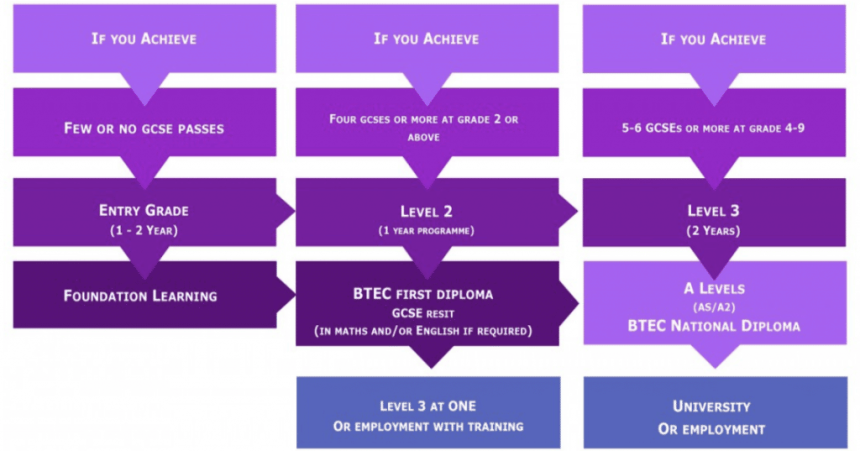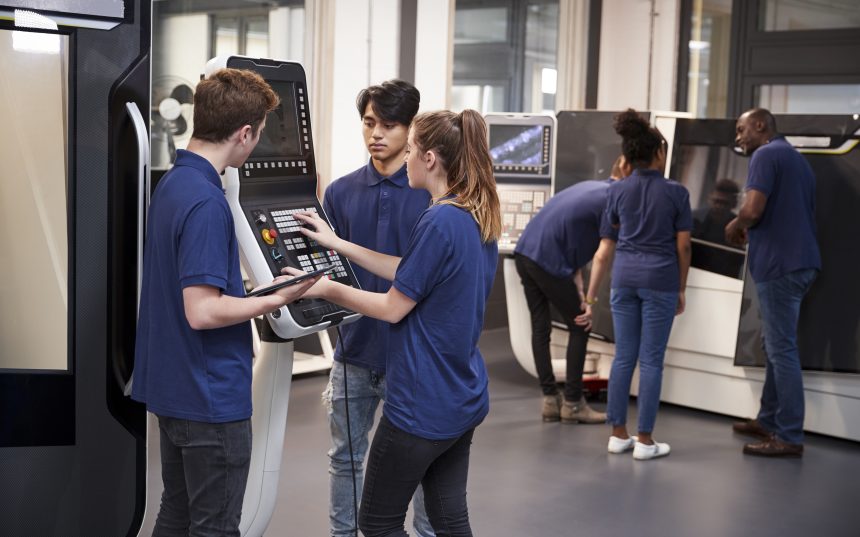When thinking about post-16 options, A Levels often take centre stage. While A Levels are a great choice for students who enjoy traditional academic subjects, they may not be the best fit for everyone. If you are someone who prefers practical, hands-on learning, or if you have a specific career path in mind that doesn’t require A Levels, then there may be other qualifications better suited to your needs. For example, vocational qualifications focus on knowledge and practical skills related to specific careers or industries.
From NVQs to Apprenticeships, this article will explore various vocational qualifications on offer so that you can make an informed decision about which path is right for you.
What are vocational qualifications?
Vocational qualifications are work-related qualifications that develop knowledge and skills related to specific career sectors, such as Engineering, IT, Business, and Healthcare. Unlike traditional academic qualifications, which often emphasise theoretical learning, vocational qualifications are designed to prepare individuals for the practical aspects of their chosen profession. These qualifications are well-suited for students who prefer hands-on learning and aspire to pursue careers that require specific technical or practical skills.
Vocational qualifications can be taken alone or in combination with other qualifications, such as A Levels. These qualifications are available at different levels. If you are new to a particular area or role, you can start with a lower-level qualification and progress as you gain experience and expertise.
More than half of students who complete vocational qualifications progress to university, while others opt to enhance their industry-specific abilities and enter the workforce directly.
There are four main types of post-16 vocational qualifications available to students in England:
- BTEC diplomas
- NVQs
- T Levels
- Apprenticeships
You may also encounter newer vocational qualifications such as Cambridge Technicals or the TechBAc.

BTEC diplomas
- BTEC stands for the Business and Technology Education Council
- Students are predominantly based in their sixth form or college
- Courses are designed around themed units and focus on skills-based learning
- BTEC diplomas can give access to higher education
What is a BTEC equivalent to?
There are various BTEC levels, ranging from 1 to 7. BTEC National Diplomas are Level 3 qualifications equivalent to A Level study. BTEC National Diplomas can be studied full-time or part-time and alongside other qualifications.
What grades do you need to do a BTEC?
Similarly to A Levels, BTECs have entry requirements. These may vary depending on the area of study and institution you are applying to.
If you are struggling with your GCSEs and are concerned that you may not achieve the grades required to study for a BTEC National Diploma, don’t worry! The flexibility in BTEC levels accommodates students with varying GCSE achievements:

How are BTECs taught and assessed?
BTECs are primarily taught through classroom learning in sixth form or college. The course also includes work placements, where you will be able to apply what you have learned in class to real-life settings.
The qualification is organised into several themed ‘units’. Instead of a single exam at the end of the course, students are assessed across each unit, allowing them to demonstrate their understanding and skills throughout the duration of the program. You may be assessed through a combination of coursework, practical tasks, or written tests. The results of each unit are averaged to give a final grade.
When you complete a BTEC National Diploma, you will be awarded one of the following grades:
- Distinction* (D*) – equivalent to an A* at A Level
- Distinction (D) – equivalent to an A
- Merit (M) – equivalent to a C
- Pass (P) – equivalent to an E
- Near pass (N) – you will pass the overall course but not each individual unit
What BTEC courses are on offer?
There are more than 2,000 BTEC qualifications on offer across 16 sectors. Typical areas include:
- Art and design
- Business
- Healthcare
- Engineering
- IT and digital
- Performing arts
- Service industries, e.g. hospitality and catering, travel and tourism
- Land-based industries, e.g. construction
- Sport
- Science
When searching for a BTEC course, explore the offerings of nearby sixth forms and colleges to see if any of their courses align with your interests. Alternatively, start by finding a course or area that interests you and then look for an institution that teaches that course. It’s best to start broad and narrow your options based on your interests, strengths, and weaknesses. Remember that research is key. The more research you do, the greater your chances of enjoying and succeeding in your chosen course.

What can you do after a BTEC?
After completing a BTEC qualification, there are several paths you can take. One option is jumping straight into the workforce. BTECs equip students with industry-specific skills and knowledge highly valued by employers. According to Pearson, the qualifying body of BTEC, 74% of employers want new hires with practical knowledge and skills combined, and 90% of BTEC students are employed full-time after graduating.
Alternatively, a BTEC qualification serves as a valuable gateway to higher education. Recognised by many universities, it allows students to pursue a diverse range of degree programmes. According to the Good Schools Guide, 95% of UK universities accept BTEC Nationals as qualifications for over 70% of their degree courses, and over 100,000 students get into university with a BTEC each year!
If you’re thinking about attending university, it’s important to explore potential course options and their entry requirements early on. BTEC qualifications are made up of a set number of units. While an 18-unit BTEC (known as the BTEC Level 3 National Extended Diploma) is equivalent to three A Levels and is accepted by many universities, students with a 12-unit BTEC (BTEC Level 3 National Diploma) may need to have an AS or A Level qualification as well. It’s crucial to research potential courses to determine whether a BTEC qualification alone will meet the admission criteria.
NVQs
- NVQ stands for National Vocational Qualification
- Students can be based in a sixth form, college, or workplace
- NVQs focus on skills and competence in specific job roles or industries
What is an NVQ equivalent to?
There are seven NVQ levels (not including entry level), each designed to assess workplace competence. Their approximate equivalents are as follows:
- NVQ Level 1 – 3-4 GCSEs graded D-G
- NVQ Level 2 – 4-5 GCSEs graded A*-C
- NVQ Level 3 – 2 A Levels
- NVQ Level 4 – Higher Education Certificate or BTEC
- NVQ Level 5 – Higher Education Diploma or Foundation Degree
- NVQ Level 6 – Undergraduate Degree or Degree Apprenticeship
- NVQ Level 7 – Master’s Degree or PGCE
You can start at a level that suits you and progress upwards as you gain experience and expertise. While NVQs don’t have to be completed in a set amount of time, most students take around one year to complete an NVQ Level 1, 2, or 3.

What grades do you need to do an NVQ?
The entry requirements for studying an NVQ can vary depending on the specific NVQ, the level, and the institution offering the course. Typically, NVQs do not have strict entry requirements, making them accessible to individuals from diverse educational backgrounds.
How are NVQs taught and assessed?
In contrast to BTECs, most NVQs are workplace-based. As an NVQ student, you will likely be a full-time or part-time employee, completing your course while you work. Alternatively, you may take an NVQ at a college alongside work placements to gain industry experience, although this option is less common.
Much like BTECs, NVQs are structured into units. Assessment does not involve traditional exams. Instead, students are assessed based on a portfolio of evidence that shows the tasks and duties they have carried out at work, as well as their achievements. The portfolio may include documents, photographs, reports, and other evidence demonstrating the application of skills and knowledge in the workplace.
Additionally, assessors will visit NVQ students in their workplace to observe and evaluate their performance of specific tasks and activities, benchmarking their proficiency against industry standards. At the end of each unit, candidates are assessed as being ‘competent’ or ‘not yet competent’, reflecting their demonstrated level of skill and readiness in the workplace.
One of the main benefits of NVQs is that students are assessed only when they are ready to pass a unit. This flexibility enables them to learn at their own pace and reduces pressure.
What NVQ courses are on offer?
There is a huge range of NVQ courses on offer, covering various sectors and industries. Some of the most popular NVQ subjects include:
- Administration and management
- Beauty and hairdressing
- Care of the elderly and children
- Catering
- Construction
- Communications
- Design
- Plumbing
- Social Care
- Travel and tourism
These are just a few examples, and NVQs are available in many other areas. To explore specific NVQ courses, you can visit the NVQ courses hub website or contact educational institutions and training providers in your region.

What can you do after an NVQ?
After completing an NVQ, there are various pathways you can pursue, depending on your goals and preferences:
- Career progression – NVQs are designed to enhance workplace competence, making individuals more skilled and proficient in their chosen field. This can lead to increased job satisfaction, more significant responsibilities, and potential promotions within current employment.
- Employment opportunities – The specific industry-related knowledge and skills gained through studying for an NVQ can open doors to new job opportunities.
- Higher Education – NVQs, particularly at Level 3 and above, are recognised by universities. Many people choose to use their NVQ as a stepping stone to higher education courses, such as Higher National Certificates, Higher National Diplomas, Foundation Degrees, or even Bachelor’s Degrees. If this is the route you plan to take, it is important to research potential courses and entry requirements carefully.
T Levels
- T Levels stand for Technical Levels
- Courses combine theory and classroom learning with practical experience
- Students are predominantly based in their sixth form or college
- Thought to offer more opportunities for higher education than other vocational courses
T Levels are a type of vocational qualification recently introduced in England as part of the Government’s efforts to offer a technical alternative to A Levels. Designed in collaboration with industry experts, companies, and education providers, they provide students with a mix of classroom learning and on-the-job experience.
What is a T Level equivalent to?
A T Level is a nationally recognised Level 3 qualification equivalent to three A Levels. Like A Levels, T Levels typically take two years to complete.

What grades do you need to do a T Level?
Over 400 institutions offer T Levels. The entry requirements for T Levels can vary depending on the specific course and institution you are applying to. While most centres demand a minimum of grade 4 in English and Maths, some may require even higher grades.
If you do not meet the required grades to apply for T Levels, or need more time to prepare, you could enrol on the T Level Transition Programme.
T Level Transition Programme
This is a one-year course designed to help post-GCSE students enhance their knowledge, skills, and work experience related to their chosen T Level area. According to the Government, students who take this course will:
- Gain technical knowledge and practical skills relevant to their chosen subject area
- Prepare for their T Level by gaining industry knowledge and experience
- Improve their study skills and build a positive work ethic
- Develop industry-relevant English and maths skills (including the attainment of GCSE English and Maths), as well as digital skills
- Receive individual support and personal development
- Plan their next steps and develop the skills to succeed in their chosen career
How are T Levels taught and assessed?
Similarly to A Levels, T Levels are classroom-based, with around 80% of the course taking place in a formal educational setting. However, learning is not limited to traditional desk-based methods. Your schedule will be packed with a variety of hands-on workshops and practical sessions.
A T Level programme encompasses a minimum of 1800 hours of scheduled learning, divided into three primary sections:
- Technical Qualification (TQ): This forms the core classroom-based element, where students delve into their chosen sectors through a curriculum designed by employers and developed by an awarding organisation. It is made up of core units, mandatory for all students, and optional occupational specialisms, providing students with the flexibility to pursue their interests.
- Industry Placement: Running for a minimum of 315 hours (9 weeks), this provides students with practical insights into their chosen sector, allowing them to apply and solidify the knowledge and skills acquired in the classroom. This is a significant difference compared to BTECs, where students only spend two weeks on placement. To gain a better understanding of T Level placements and their benefits, you can watch videos of students who have undertaken them.
- English, Maths, and Digital Provision: Integrated into the classroom-based element, this ensures that students acquire a strong foundation in transferable skills.
Depending on the course taken, T Levels may be assessed through a combination of coursework, practical projects, and external examinations. Unlike A Levels, students are assessed throughout the duration of the T Level course.

After you complete a T Level, you will receive an overall grade based on your performance across all components of the programme:
- Distinction* – equivalent to AAA* at A Level
- Distinction – equivalent to AAA
- Merit – equivalent to BBB
- Pass (C or above on the core component) – equivalent to CCC
- Pass (D or E on the core component) – equivalent to DDD
Students who do not pass their T Level will receive a ‘statement of achievement’ that showcases the completed sections of the course and their respective grades. This means that even if a student fails one section of the course, they will still have something to present to potential employers.
Students also have the opportunity to resit their core T Level exams and projects during Pearson’s annual exam series.
What T Level courses are on offer?
The first T Levels were introduced in September 2020 at selected centres across England. By September 2024, more than 20 T Level subjects will be available, covering a range of sectors, including:
- Agricultural, Land Management and Production
- Animal care and Management
- Management and Administration
- Catering (September 2024 onwards)
- Building Services Engineering for Construction
- Design, Surveying and Planning for Construction
- Onsite Construction
- Craft and Design (September 2024 onwards)
- Media, Broadcast and Production (September 2024 onwards)
- Digital Business Services
- Digital Production, Design, and Development
- Digital Support Services
- Education and Early Years
- Design and Development for Engineering and Manufacturing
- Maintenance, Installation, and Repair for Engineering and Manufacturing
- Engineering, Manufacturing, Processing and Control
- Health
- Healthcare Science
- Science
- Accounting
- Finance
- Legal Services
- Marketing (September 2024 onwards)

After completing a T Level, there are several paths you can pursue.
- Get a job: You could enter the workforce directly and apply your skills and knowledge in a relevant industry. T Levels equip you with industry knowledge, skills, and experience, so many employers value these qualifications.
- Apprenticeship: You may choose to continue your education through an apprenticeship program. This will allow you to work while gaining further practical experience.
- Higher education: T Levels earn UCAS points, just like A Levels and BTECs, and an increasing number of higher education institutions accept them for entry into their courses. If university is the route you plan to take, it’s essential to conduct thorough research on the entry requirements for the courses you’re interested in.
Problems with T Levels
Since their launch in September 2020, T Levels have faced significant criticism from Ofsted.
Across institutions, there has been considerable variation in their success and student experience with T Level courses has been mixed. Some students found the courses fulfilling, while others felt misled and ill-informed about course content and structure. The quality and effectiveness of T Level courses need improvement due to challenges in initial assessments, weaknesses in teaching resources, concerns about the high volume of content, and issues with industry placements. Although most students who complete their course successfully obtain the qualification, many students drop out before finishing.
According to James Kewin, the deputy chief executive of the Sixth Form Colleges Association, Ofsted’s report “is clear that T Levels are not yet the gold-standard, mass-market replacement for BTECs the Government believes them to be”.
T Levels are highly adaptable qualifications, but there is still a lot of work to be done. Therefore, if you are planning to pursue a T Level, it is critical to conduct extensive research and keep yourself informed about these ongoing challenges, so that you can make well-informed decisions about your future.
Apprenticeships
- Students spend the majority of their time on placement
- Apprenticeships focus on practical knowledge and application of skills
- Students are employed for the duration of their apprenticeships
What is an apprenticeship equivalent to?
There are six apprenticeship qualification levels, spanning from Level 2 to Level 7. Each are categorised as Intermediate, Advanced, Higher or Degree apprenticeships:
- Intermediate Apprenticeship (Level 2): Equivalent to GCSEs
- Advanced Apprenticeship (Level 3): Equivalent to A Levels
- Higher Apprenticeship (Level 4-5): Equivalent to a Foundation degree and above
- Degree Apprenticeship (Level 6-7): Equivalent to a Bachelor’s or Master’s degree
The duration of apprenticeships can vary, ranging from one to six years, depending on the level and field of study. Similarly to NVQs, there is often an opportunity to advance to higher-level apprenticeships.
What grades do you need to do an apprenticeship?
Apprenticeships are real jobs and entry requirements will vary depending on the industry and employer. Typically, to be eligible for an intermediate apprenticeship, you must be at least 16 years old and no longer enrolled in full-time education. If you are considering an advanced apprenticeship, you will likely need a minimum of three GCSEs with grades 9-4, as well as prior work experience.

How are apprenticeships taught and assessed?
If you decide to become an apprentice, your schedule will consist of both practical training in the workplace (80%) and classroom-based learning at a college (20%). To successfully balance both aspects of the course, you will need to have good time management skills.
Apprentices are expected to work 30 to 40 hours per week, including time spent in college and training. You will be employed for the duration of your apprenticeship and will also receive holiday pay. Your salary will depend on various factors including your age, the region you are in, and the specific apprenticeship you are undertaking.
At the end of your apprenticeship, you will be assessed to ensure that you are competent in your role. This is known as an end-point assessment. If you pass, you will be awarded your apprenticeship. Apprenticeship assessments are typically conducted by the training provider and externally validated by an awarding organisation. They may involve:
- a practical assessment
- a project
- an interview and presentation
- written or multiple choice tests
What apprenticeships are on offer?
There are more than 600 different apprenticeships available covering a variety of industries. The most popular sectors include:
- Business, Administration, and Law
- Health, Public Services, and Care
- Engineering and Manufacturing Technologies
- Retail and Commercial Enterprise
The apprenticeships available will vary depending on your location, interests, and the specific opportunities offered by employers or training providers.
How to find an apprenticeship
There are many avenues through which you can find an apprenticeship in England:
- Use the Government’s find an apprenticeship service
- Contact the National Apprenticeship Helpdesk on 0800 015 0400 or by email at [email protected]
- Check out the Amazing Apprenticeships YouTube channel for hints and tips on applying to apprenticeships
- Contact local businesses and ask if they would be interested in taking on an apprentice
Once you have found an apprenticeship that interests you, you can register and apply for it through the Government website. The application process is similar to creating your CV. It’s important to take your time and think through what you want to write in each section. If you are applying for multiple apprenticeships, make sure you tailor your content to the specific role. Don’t just copy and paste the same content for all applications!
What can you do after an apprenticeship?
Apprenticeships provide a gateway to numerous opportunities. Upon completion of an apprenticeship, many individuals are offered full-time employment with the same company or organisation where they received their training. This provides a great opportunity for apprentices to build a long-term career in their chosen field.
Apprenticeships also provide a pathway to further education. Many apprentices choose to pursue additional education, such as earning a degree or obtaining industry-specific certifications. This can help them further advance their careers and increase their earning potential.
When it comes to post-16 education, there are many vocational qualifications available. It’s important to consider multiple factors when choosing the best option for you. What is your learning style? Do you prefer traditional textbook-based classroom learning or gaining experience through hands-on activities? What are your future goals and aspirations? Do you want to attend university or jump straight into the job market? What industry would you like to work in and what qualifications are required to enter that field? With thorough research and careful consideration, you can look forward to a fulfilling and successful future.








Comments